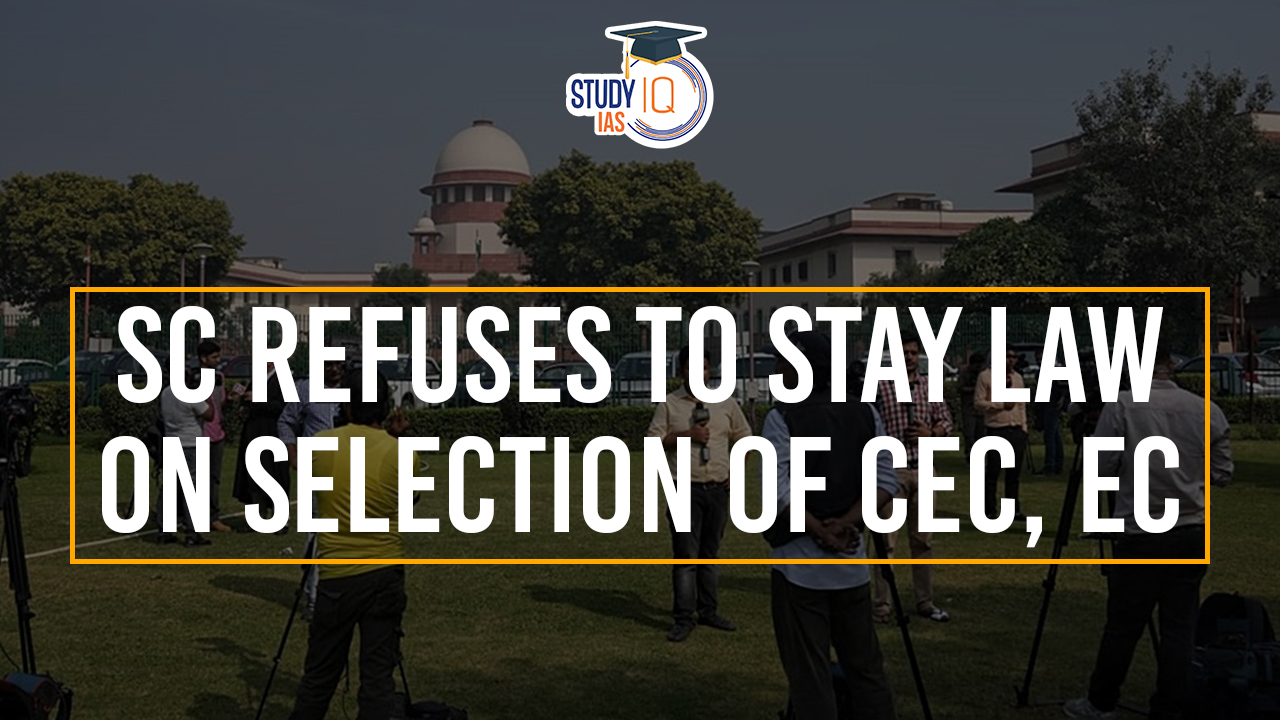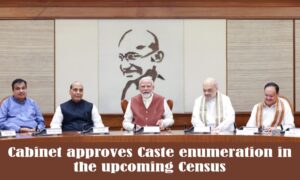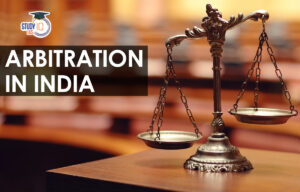Table of Contents
Context: The Supreme Court declined to stay the CEC and other ECs (Appointment, Conditions of Service and Term of Office) Act 2023.
How are the CEC and ECs currently Appointed?
- Article 324 provides the structure of the Election Commission of India (ECI), comprising the Chief Election Commissioner (CEC) and two additional Election Commissioners (ECs).
- The President is responsible for appointing the CEC and ECs, subject to the provisions of any legislation enacted by Parliament (provided in the Constitution).
- Present law only provides for the terms for ECI officials, but not their appointment.
- This raises concerns about independence, as appointments by the President (effectively the government) lack a formal check for neutrality.
We’re now on WhatsApp. Click to Join
Key Highlights Of the CEC and other ECs (Appointment, Conditions of Service and Term of Office) Act 2023
The new bill replaces the Election Commission (Conditions of Service of Election Commissioners and Transaction of Business) Act, 1991. It provides for the following:
- Appointment Process: The Chief Election Commissioner (CEC) and Election Commissioners (ECs) will be appointed by the President upon the recommendation of a Selection Committee.
- Selection Committee: The Selection Committee will consist of:
- Prime Minister
- Union Cabinet Minister
- Leader of Opposition/leader of the largest opposition party in Lok Sabha
- Search Committee: A Search Committee headed by the Cabinet Secretary will propose a panel of names to the Selection Committee.
- Eligibility: To be eligible for the posts, candidates must have held (or currently hold) a post equivalent to the Secretary to the central government.
- Salary and Conditions of Service: The salary and conditions of service of the CEC and ECs will be equivalent to that of a Cabinet Secretary. This is a change from the 1991 Act, which pegged their salary to that of a Supreme Court Judge.
Issues and Concerns Associated with the Bill
- Issue surrounding recommendation of Selection committee: The Bill upholds the validity of the Selection Committee even if there is a vacancy or defect in constituting the Committee. However, of the 3 members, only the post of Leader of Opposition in the Lok Sabha can be vacant. This means a situation can arise where before elections the selection committee will consist exclusively of the ruling party.
- Selection committee may overlook Search committee recommendations: The selection committee can go beyond the names suggested by Search committee. This will undermine the role of the Search committee which specifically holds the expertise to look for potential candidates.
- Government Influence on CEC and EC Salaries: The Bill proposes equating the salaries of the Chief Election Commissioner (CEC) and Election Commissioners (ECs) with that of the Cabinet Secretary.
- This change could potentially increase executive influence over the CEC and ECs’ salaries as Cabinet Secretary salary is determined by the Government based on the recommendation of the Central Pay commission.
- Restrictive Eligibility for CEC and EC’s: The Bill’s stipulation that only individuals of Secretary rank or above in government are eligible for the roles of Chief Election Commissioner (CEC) and Election Commissioners (ECs) may preclude other capable candidates. This criterion overlooks the Election Commission’s quasi-judicial functions, like adjudicating parliamentary disqualification and political party disputes.
- Concerns with Composition of Selection Commission: The proposed Selection Committee for appointing the CEC and ECs, comprising the Prime Minister, a Cabinet Minister, and the Leader of the Opposition, raises concerns about potential government dominance in the appointment process.
- ECI’s constitutional role and duties necessitate a more independent appointment mechanism, as directed by the Supreme Court.
Suggestions Made by Various Commissions/Courts for the Composition of the Selection Committee
| Body | Members |
| Goswami Committee (1990) |
|
| National Commission to Review the Working of the Constitution Report (2002) | Prime Minister + Leader of the Opposition in Lok Sabha + the Leader of the Opposition in Rajya Sabha + the Speaker of Lok Sabha + the Deputy Chairman of Rajya Sabha. |
| Law Commission (2015) | Prime Minister + the Leader of Opposition of Lok Sabha (or the leader of the largest opposition party in Lok Sabha) + the Chief Justice. |
| Supreme Court (2023)
(Anoop Baranwal v. Union of India Case) |
Prime Minister + Leader of Opposition in Lok Sabha (or leader of single largest opposition party in Lok Sabha) + Chief Justice. |
Global Practices Of Selection Process of the Election Commission
- United Kingdom: The Election commissioner is appointed by the Monarch upon the approval by the house of Commons.
- United States: The commission is appointed by the President and confirmed by the Senate.
- Canada: Appointed by the resolution of the House of Commons.


 Cabinet Approves Caste Enumeration in th...
Cabinet Approves Caste Enumeration in th...
 Phenome India Project: Mapping India's H...
Phenome India Project: Mapping India's H...
 Arbitration in India, Types, Benefits, R...
Arbitration in India, Types, Benefits, R...





















